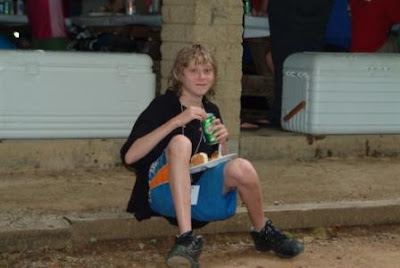Right now I'm waiting for my younger son to drop by. He and I are going to go for a bike ride. It is one of those, "Why didn't I earlier?" moments.
He and his family were forced out of Central Asia earlier this year--bureaucratic/visa related--so he has been here in Covington since June. "Let's get together & ride." "We really need to do that." Now he is leaving tomorrow for a new ministry in Austin Texas, and this is the first day we are riding.
My favorite toy--my boat has been messed up all summer. I just took it to the shop 2 weeks ago and got it fixed. In spite of it being fall it's been on the water a couple of times since then. My Texas-bound son and his family love boating. Lord willing we'll go out this afternoon. Again, "Why did I wait so long?"
Yesterday the Covington Bible Church honored us for 35 years of ministry here. It was a lovely day. My son, Chris, and two guys that I have been privileged to mentor, spoke yesterday morning. I felt very loved and honored, by all the attention, gifts, cards, and kind words. Still I confess that there is some backward looking.
I saw the mention of a book this morning--a classic more than 100 years old. As I have in the past, I made a mental note. "I need to read that." "Why have I waited so long?"
Part of the answer has to do with life. James Dobson once said (I'm sure he isn't the only one, but he is the one I heard.) "This life is just one thing after another." In my community, in my church, in my family, and in my life that has certainly been the case. An old joke talks about having
my people contact your people. Well, for most of my life
my people have consisted of me.I have remodeled--built part of it from the ground up--the house where I, my wife, and my mom lives. I have also lived in this house for 35 years. I entered into a real-estate retirement project 10 years ago, where I was able to invest labor instead of money. I had hoped to be out of it by now, but you know about the real-estate market, and for business property in a declining community that is even more-so. As I type, there is a window sitting next to me. I plan to install it as a gift to my lovely wife. I am finishing up--I hope--a remodel of my study over at church. It is different than most such projects in that the materials I started with is mostly rough-sawn cherry lumber. I ran it through the planer, cut it, joined it, shaped it, and put it together. I have some buddies who have "remodeled" their offices. If their hands got dirty it was only from the ink from the magazines they looked through so they could show somebody else what they wanted. By the way, the church building where my study is, was built by volunteer labor, including mine
I have embraced and walked with my older son as his marriage spiraled down and he divorced and fought for his kids. One episode in that saga is the hardest thing I ever did in my life. By God's grace all four children are with him. I rejoiced with him through God's gracious provision of a Godly wife. He celebratd his second anniversary yesterday--two-weeks. : )
I agonized with my younger son as he valiantly dealt with the bureaucracy to try to continue his ministry, that was still in embryonic form, in Central Asia. I have recently rejoiced with him in the obvious leading of God to his new place of service. Though half-way across the country is a lot different than half-way around the world, I will miss him and his family.
My hip and wrist are screwed together, as a result of two accidents.
So, I don't want you to think that my questioning look over my shoulder is a result of not having been busy.
So, in case there are some younger pastors reading this, what would I have done differently?
- I would have read more.
- I would have begun to travel the world, plugging into missions, earlier.
- I would have done less. Let me tell you what I mean. Another small church pastor friend of mine once purposely didn't change a light-bulb for something like 6 months. If I remember right he finally lost the battle. I.E. he wanted to make the point that other folk should be doing that kind of thing. They shouldn't expext the pastor to do all that. There is a dynamic that goes on here. In a small church there is often only one person who is at the building on Monday, Tuesday, Thursday, etc. I fear that over the years I have trained some people wrongly.
- I would play more, and play more purposefully. Actually, I don't think I have done too badly at this.. I used to jog, snow-ski, hunt, fish, and play at basketball. I still ride bike and enjoy water-sports and wood-working. I would just do that stuff with more abandon. I would have more pages in my mental scrap-book.
There are also things that I definitely don't regret.
I don't regret a moment of the time invested in my family.
No misgivings about remaining here for all of my career.
Likewise I am glad that I chose a few years ago to take a more active part in missions.
My wife remains the joy of my life.
Enough.
I may write some more later.










 (On the left, a surprised Tanisha chats with future brother-in-law, Chris)
(On the left, a surprised Tanisha chats with future brother-in-law, Chris)























